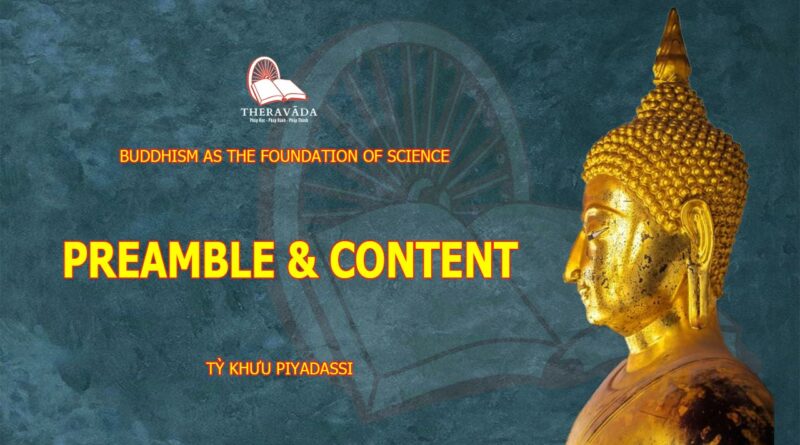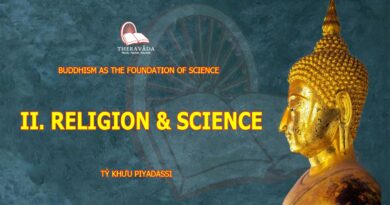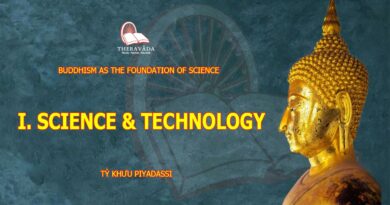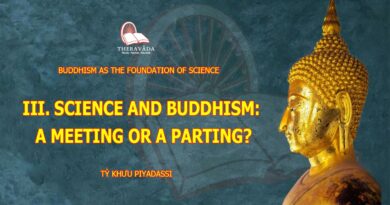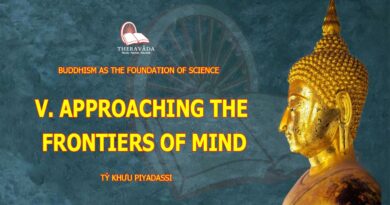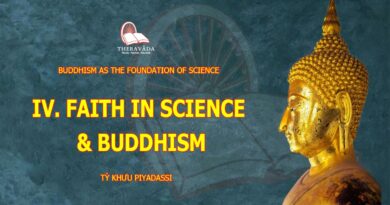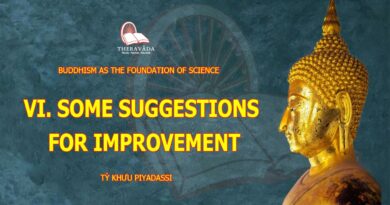Nội Dung Chính [Hiện]
BUDDHISM AS THE FOUNDATION OF SCIENCE
Bhikkhu Prayudh Payutto
National Science Day Lecture, given at the University of Chiang Mai, Northern Thailand, on August 16, 1991.
PREAMBLE
Today the Science Faculty of the University of Chiang Mai has kindly honoured me with an invitation to address you all on this important occasion. I have heard that many of you were surprised to hear that a Buddhist monk would be invited to talk about science. Although it may seem incongruous, I feel that such a reaction is unwarranted. We may have to come to some understandings with each other before the lecture is begun in order to get into the right frame of mind.
This perception of a monk as a religious expert talking about scientific matters may be a result of modern tendencies. Our age is an age of specialists. We tend to put people into pigeonholes, such as religious, scientist, economist, political scientist and so on, each specializing in his or her own particular field. But I don’t feel that I am a religious expert, and I don’t want to be called one. I am simply a Buddhist monk.
Buddhist monks and religious experts are not the same. To be a Buddhist monk is to live a way of life. To use the current trend we could say that it is a ‘specialized’ way of life. Religion, on the other hand, is a specialized branch of knowledge. One who has a specialized life style has a role to play, defined by the constraints of that life style, one which, in this case, is designed to allow him to live as skilfully as possible on both the personal and social levels. Specialized sciences result from dividing knowledge up into categories. In this sub-dividing there is no consideration of life-style, it is a purely academic concern. In this light it would probably be inaccurate to call a Buddhist monk a religious expert.
So the organizing of this lecture, “Buddhism as the Foundation of Science”, should not be looked on as a meeting between two disparate academic disciplines. This kind of attitude leads to the impression that you are about to witness some kind of peculiar confrontation.
By putting ourselves into the right frame of mind we will see that science is our subject of discussion. Science is our meeting ground. Scientists are the owners of this branch of knowledge, the ones most conversant with it, and now the scientists are giving an opportunity to an outsider to take a look at science and give some reflections. Understanding it in this way, I feel you will more easily be able to grasp the spirit of the lecture.
Bearing this in mind, it isn’t necessary for the speaker, an outsider, to have such a vast knowledge of the subject of science. He may know some, of some he may be ignorant, he may speak rightly or wrongly, but even so there is something to be gained from the lecture, even if only an idea of how scientists are viewed by outsiders.
Now what benefit is to be gained from such knowledge? Practically speaking, it is impossible to live or act completely alone. We must interact with other ways of thinking and with events around us. We must be able to work cohesively with other people and other branches of knowledge. If such inter action is successful, then the quality of our own work is enhanced. If we cannot interact successfully, our own activity or field of knowledge suffers accordingly. For that reason, inviting outsiders to take a look and give their reflections on science is useful. It will enable you to get a broader perspective, to interact with the outside world and with other branches of learning, which will in turn help your own work. The result is a more broad minded and flexible outlook.
So we are agreed that this lecture is about science through the eyes of an outsider, in this case a Buddhist monk. As to how a Buddhist monk views science, this will become clear a, the talk progresses.
A second point that I would like to clarify, before going on to the main body of the talk, is in relation to the title of the lecture. Not only is a religious person talking about science, but he is even claiming that Buddhism is the foundation of science! I won’t go into the reasons for this title at present, but would simply like to state that it is inspired by the words of a scientist, and a very great one at that. He didn’t use these exact words, but I don’t think I have misrepresented him. In any case, I don’t put too much weight on the matter, and as I will be explaining it a little later on, I don’t think you need trouble yourselves over whether Buddhism really is the foundation of science or not. Any benefit you obtain from today’s lecture, or whether Buddhism really is the foundation of science, are things that you can each decide for yourselves at your own discretion.
In addition to this I would like to clarify the meaning of two of the words that I will be using throughout this talk, and they are ‘Buddhism’ and ‘Science’.
Buddhism in this context should be understood not as the institutional form of Buddhism, but to its essential teaching, which is an abstract quality.
As for Science, we may have a problem. Some scientists may feel that in this context, only Pure Science should be considered, not Applied Science or technology. But whenever the average person thinks of the word ‘science’, he thinks of the whole totality, not this narrow definition. I myself come as an ordinary person, being, like many others, an outsider. So I speak of science in a very general and indistinct sort of way, which takes in both the Applied and the Pure Sciences. There may occasionally be times where I distinguish between them, at which points I will make it known.
… Science is essentially one with nature, but these days most people feel that what we call science is not natural …
CONTENTS
I. SCIENCE AND TECHNOLOGY
A doubtful progress
The alienation of science and nature
Two kinds of technology
The place of ethics
Science and technology cannot be separated
Reaching the limits, finding no answer
Values and motivations
Behind the prosperity
II. RELIGION AND SCIENCE
From common beginnings to separation
Many religions, one science
A clarity that is not free of confusion
Towards a unity of science and religion
When faith in science is shaken, even the worshipping religions flourish
Not above blunders
Mankind will only realize the highest good when science and religion integrate
III. SCIENCE AND BUDDHISM: A MEETING OR A PARTING?
Like a religion, but not …
The natural religions: understanding nature through wisdom
Good and evil
The Law of Kamma: Scientific morality
The question of free will
1.FAITH IN SCIENCE AND BUDDHISM
The role of faith
The difference between faith in Buddhism and science
Man-centred versus self-centred
A similarity of methods with a difference of emphasis
Differences in methods
2. APPROACHING THE FRONTIERS OF MIND
The limitations of scientific knowledge
The material world: science’s unfinished work
Ethics: a truth awaiting verification
‘What is’ versus ‘what should be’
True religion is the foundation of science
Accepting the sixth sense
3. SOME SUGGESTIONS FOR IMPROVEMENT
Too little
Too late
The problem of development can only be addressed when values are truly understood
Encouraging constructive technology
REFERENCES

